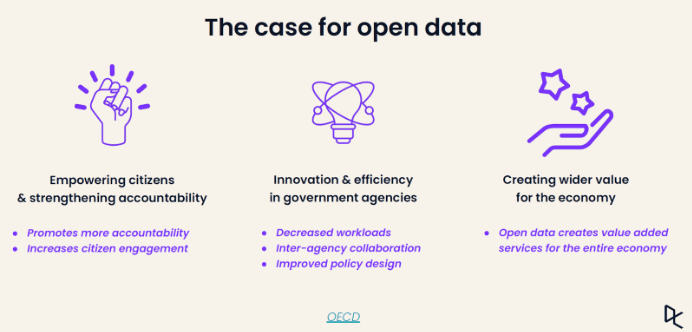Data democratisation. The philosophy of making data accessible to all employees within an organisation – regardless of their technical expertise or role.
A move from modern companies that has been gaining in popularity in recent times, data democratisation ensures that data is easy to access, understand, and use for decision-making by all.
By adopting this mentality, as well as taking other actions throughout the business, data democratisation is one of the top ways to foster a culture of transparency and innovation.
This is the subject of an upcoming LinkedIn Live between Harnham’s Fabian Briceño Toro and Piethein Strengholt, Chief Data Officer at Microsoft Netherlands. You can register to attend HERE.
Why is data democratisation so important?
For companies today, data has become one of the most valuable assets when it comes to staying competitive and making informed decisions. A 2023 IDC whitepaper found that truly data-driven companies see significantly better business outcomes than those that aren’t.
More specifically, companies that had their employees use data in a meaningful way with a clear strategy has three times higher improvement in revenues and were three times more likely to report shorter times to market for new products.
Data-Driven Decision-Making
Microsoft Netherlands’ CDO Piethein Strengholt, speaking to Harnham today, said: “For us, data democratisation is crucial. Yes, it enables faster decision-making and yes, it enhances productivity, but one think we’re really seeing it do is instill a data-first culture internally.
“And when you start to see employees from all across the business start to think more purposefully about their decisions and the data that can back them us, you start to build a really powerful workforce.”

The case for open data (Source: DataCamp)
By making data easily accessible, companies like Microsoft are enhancing their productivity and facilitating a more agile and responsive business environment. Implementing business intelligence tools is essential for effective data democratisation. These tools enable business analysts to access and analyze data seamlessly, driving better business decisions. This broader access to data enables self-service analytics, empowering business users and non-technical users to derive insights independently, reducing reliance on IT departments and accelerating decision-making.
What are the challenges with implementing data democratisation?
This all sounds great – but democratising your data comes with challenges, especially for bigger companies.
“Ensuring data quality and security is paramount,” says Piethein, “as widespread access increases the risk of data breaches.
“Also, there is a further need for robust data & AI training programs to equip employees with the skills to interpret and use data effectively.
“Roadblocks like these can play a key part in slowing down the adoption and freer use of data for enterprises. That’s why its also important to clearly communicate the advantages of democratisation to all stakeholders, as well as involving them earlier in the process to gather input, address concerns, and ultimately reduce resistance.”
A strong governance strategy is vital for successful data democratisation. It ensures data quality, security, and compliance, allowing broader access without compromising integrity. Incorporating data democratisation into the business strategy can transform how teams operate. It promotes a data-driven culture that supports innovation and efficiency across the organization.
Empowering Employees and Enhancing Business Performance
Not only can data democratisation help an enterprise speed up its data pipelines, it can empower people to find new ways to solve problems through a better awareness of how to analyze and work with data.
Gartner says that by adopting data democratisation, organisations can solve resource limitations, decrease bottlenecks, and enable business units to handle their own data requests more easily.
Data democratisation bridges the gap between technical and non-technical users, enabling everyone in the organization to make data-driven decisions and contribute to business growth. An effective data democratization initiative requires careful planning and execution. It involves addressing security concerns, providing extensive training, and ensuring ongoing support to maintain momentum.
Key Benefits of Data Democratisation
- Competitive Edge: Data-driven decisions provide a competitive edge by enabling quicker, more informed responses to market changes.
- Business Growth: Enhanced data accessibility can drive business growth by improving operational efficiency and innovation.
- Improved Customer Experience: Better data insights can lead to a more personalized and effective customer experience.
- Increased Job Satisfaction: Empowering employees with data can lead to higher job satisfaction as they can see the direct impact of their work.
Human resources play a pivotal role in data democratisation by identifying training needs and facilitating programs that enhance data literacy across the organization. The democratisation of data should be an important consideration for any company looking to get more out of their data – and their workforce too.
You can hear more from Piethein on September 19, as he appears alongside Harnham’s Fabian Briceño Toro on our upcoming LinkedIn Live. Sign up HERE.
Learn more about our Data & AI talent solutions HERE.

























